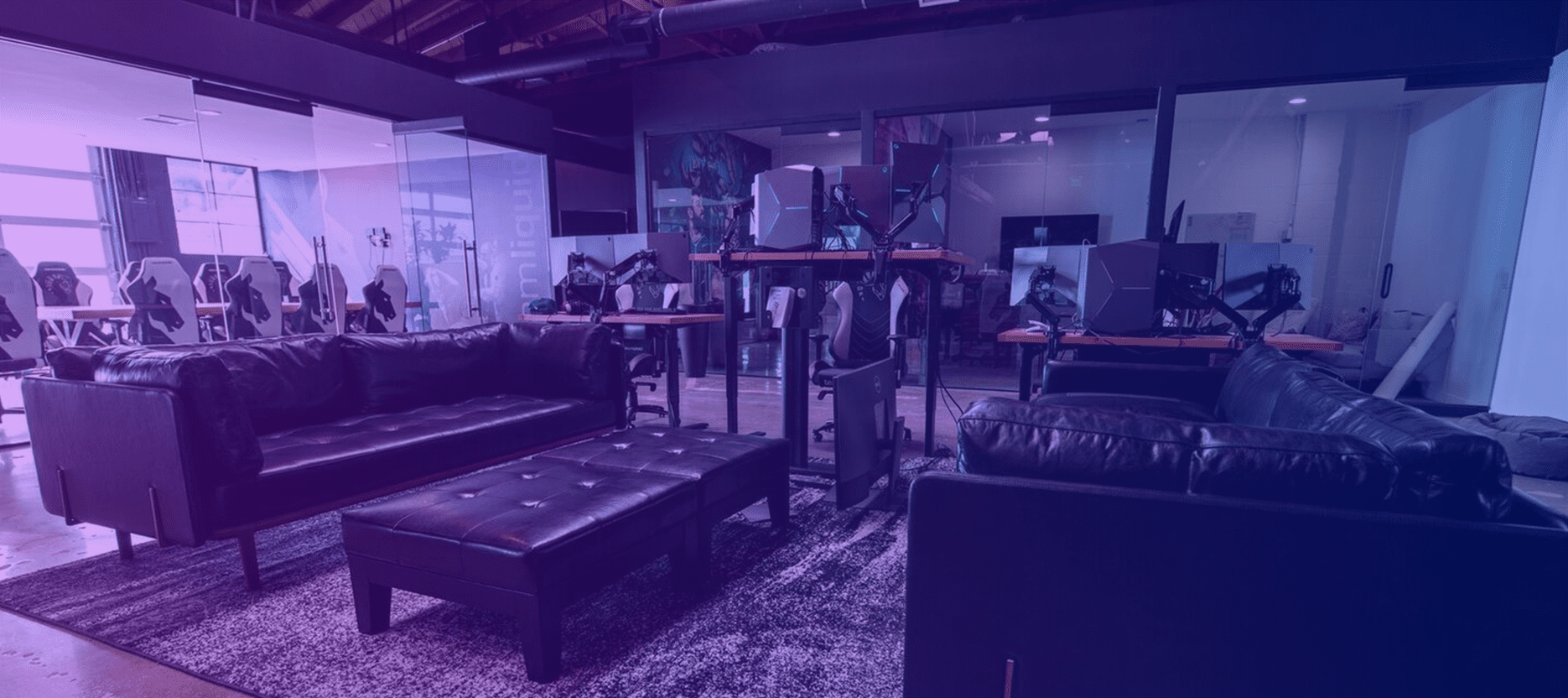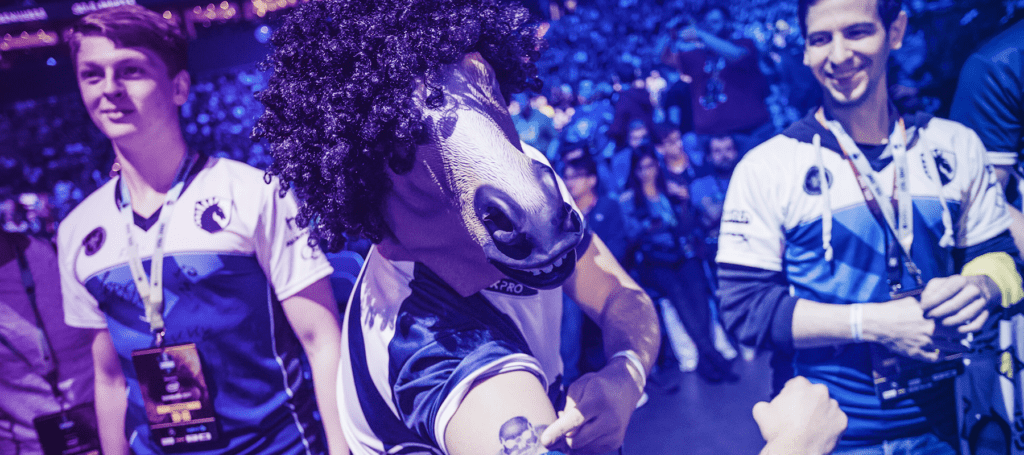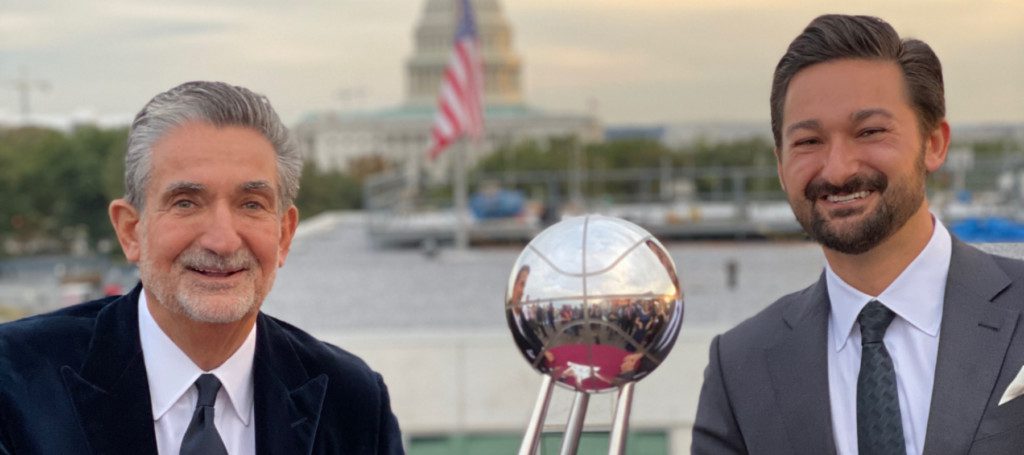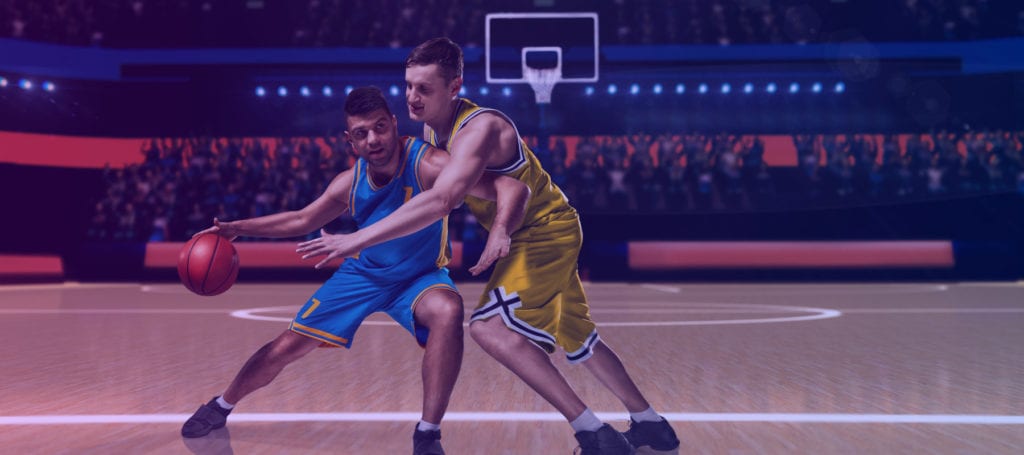Via Axiomatic Gaming | News
Esports training facility brings gaming another step closer to traditional pro sports
May 10, 2018 | Author: Leo Hsu
SANTA MONICA, Calif. — On a Tuesday morning in March, five half-awake young men comprising the Team Liquid roster shuffled into the esports franchise’s new training space. They walked through the neon-accented foyer and into the dining area, where they grabbed catered omelets with fresh sliced tomatoes and avocados, fruit cups, toast and coffee, and sat down in wood booths.
As the caffeine kicked in, some of the players began to talk business, mostly in Korean, with English exclamations, reviewing their performance the previous night during the League of Legends’ Championship Series (LCS) regular season. After the meal, the team’s assistant coach called the men into their colorfully lit film room featuring a 120-inch screen. The coaches used an interactive tablet to mark up gameplay footage, just like the telestrations on NFL broadcasts.
After dissecting the film, the players shifted to another part of their team-exclusive facility featuring a row of top-of-the-line gaming computers akin to the players’ competitive environment. They slipped into monogrammed gaming chairs, each bearing a gamer’s name, and began their training regimen.
It was, in many ways, similar to the start of a practice day for any professional sports team.
The opening of Team Liquid’s new training facility is a recent example of how esports organizations in North America are increasingly putting themselves on par with professional and collegiate teams in traditional sports, providing organized environments and structure to support their players and staff. It is a literal architecture that teams believe will help sustain the stunning growth of esports properties such as the LCS.
The goal is to not only improve the caliber of current players and develop prospects into future pros, but also instill a culture of professionalism to a group of players used to operating on their own from remote locations or in team houses in which players both work and reside.
With their new home, Team Liquid joins esports franchises Immortals/Los Angeles Valiant and Echo Fox in Los Angeles in moving away from the gaming house model and toward a more professional setup.
“When we formed the idea of a training center, it got [the players] out of training and living in the same environment,” said Bruce Stein, co-founder and CEO of aXiomatic Gaming, which holds the controlling stake in Team Liquid. “We felt that was a little stifling. It didn’t give them a separation between relaxation and work. And it wasn’t the ideal setup for training with the coaches and the analysts. So, we built a facility.”
‘The next evolution of esports’
Located just down the road from Lionsgate’s headquarters and Amazon Studios in this upscale Los Angeles-area coastal city, Team Liquid’s Alienware Training Facilities sit in a nondescript, 8,000-square-foot space in an office park. The lack of external allure belies the building’s glistening, amenity-rich interior but also its importance as a key component in what the team believes to be “the next evolution of esports.”
The facility includes a conference room with a mammoth screen and three game-themed lounges, all of which have murals of the team’s past glories. There’s a kitchen and dining area — on-site chef included — and dedicated areas for scrimmages for Team Liquid’s LCS (the League of Legends’ top league), Academy (its minor league) and Counter-Strike: Global Offensive teams — the three teams onsite.
Each squad also has a couch-rimmed film rooms for postgame analysis and film sessions. There’s also an on-site production studio tasked with creating original video for YouTube, helping to promote Team Liquid and its players, as well as commercials. The team also has access to a nutritionist, sports psychologist and gym memberships.
Combined, the team believes its amenities represent “a new precedent for how players and staff integrate and operate like a real company,” according to a YouTube video tour of the facility.
The setup blends developmental tools with creature comforts so it doesn’t “feel like you’re sitting in an office meeting,” according to Stein.
“That part was what was unique to the industry [about the facility]. Nobody had ever done that before and we did it with some trepidation because you don’t know how the players in the community will respond,” Stein said, noting that esports has a unique culture teams must treat with some reverence. “Fortunately the team response has been phenomenal.”
Team Liquid’s Yiliang “Doublelift” Peng is one of the world’s top League of Legends players, and is known for his brash online presence. He has more than 800,000 followers on Twitter.
“I think this facility is insane,” said Peng, who received national media attention in April after his brother was charged with the murder of their mother. “Six years ago I was scrimming [practicing] out of like this tiny, dinky house in Diamond Bar [in Eastern Los Angeles County], the cheapest possible place you could fit five people.”
A blending of sports worlds
The idea to move away from the gaming house setup and into a practice facility stemmed in part from the involvement of Ted Leonsis and Peter Guber, co-owners of aXiomatic who serve as co-executive chairmen along with Jeff Vinik and Bruce Karsh. Leonsis also owns the NBA’s Washington Wizards and NHL’s Washington Capitals, among other pro teams, while Guber is a co-owner of the NBA’s Golden State Warriors and MLB’s Los Angeles Dodgers. Vinik is the owner of the NHL’s Tampa Bay Lightning and a minority owner of MLB’s Boston Red Sox. Given the success of their traditional sports franchises, the idea was to blend some of the best practices from those teams to coax more from Team Liquid’s players.
“There’s been this arms race in the NBA and the NHL where your practice facility becomes a differentiator on where a free agent wants to come because they spend more time at the practice facility than they do playing,” Leonsis said. “So we wanted to make sure that we had a culture from day one that treated esports players as professionals and that why aXiomatic and Team Liquid could be different was that, because we would treat them with that kind of respect, they would be rest assured that we would get the best out of them and we could help develop them to be the best player they could be.””
The facility was designed in partnership with the team’s sponsor, Alienware, whose name, logo, and associated neon accents are conspicuously displayed.
At the facility, players have access to the latest monitors, computers, keyboards and mice, in addition to the team’s coaches and support staff. Overall it fosters a more structured and work-focused environment compared to esports houses.
“Players would just wake up at 10:28 for a 10:30 morning and just crawl out of their beds to it,” assistant coach Jun “Dodo” Kang said, speaking about how it was in the gaming house.
Coach Nu-ri “Cain” Jang said, via translation: “Having living and working space in the same place makes it too relaxed for the players. . . . Separating that just helps players focus on being professionals. Like, you’re waking up and actually going to work.”
Kim “Olleh” Joo-sung, one of the Korean players, said the facility helps him stay more balanced.
“I have no friends, so I just stayed there,” he said with a smirk.
As young men who have grown up in a more decentralized work environment, worker ills of the past have actually become advantages from their perspectives.
“I didn’t know how amazing it was in real life that normal people can just walk to their boss and talk to them and, like, I can do that now, too! And that’s such a first, I’ve never been able to do that,” said Peng, who expressed past frustration with trying to schedule meetings with off-site staff. Now, the staff are either next door or in the main foyer.
The facility not only helps the players hone their skills, but the hope is it also can help in recruiting the next generation of pro gamers. Leonsis saw this with the Capitals, with the Kettler Capitals Iceplex facility attracting NHL free agents.
“[NHL veteran] Mike Knuble is a great example,” Leonsis said. “Mike has been with a lot of teams and was wowed by Kettler. . . . And his suggestion to us, which we did, was allow, on occasion, visiting teams to practice on the other side at Kettler, so that they would be exposed to it and they would talk about it.”
As much as the facility seems to help with performance — Team Liquid won this year’s North American LCS Spring Split — it also points to the continued rise in the prestige of esports.
For Peng, the facility reflects a growing sense of respect toward his fellow players and their craft, even as mainstream society over a certain age is still largely coming to terms with esports’ emergence as a legitimate part of the global sports scene.
“It’s going to be this niche thing, until it isn’t, like UFC,” Peng said. “I don’t care too much about the label. I’m a pro league player and I’m really proud of it.”





